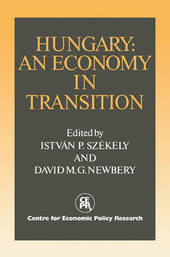
|
Hungary: An Economy in Transition
Paperback / softback
Main Details
| Title |
Hungary: An Economy in Transition
|
| Authors and Contributors |
By (author) Istvan Szekely
|
|
By (author) David M. G. Newbery
|
| Physical Properties |
| Format:Paperback / softback | | Pages:392 | | Dimensions(mm): Height 234,Width 156 |
|
| Category/Genre | Development economics |
|---|
| ISBN/Barcode |
9780521057547
|
| Classifications | Dewey:338.9439 338.9439 |
|---|
| Audience | | Professional & Vocational | |
|---|
| Illustrations |
44 Tables, unspecified; 12 Line drawings, unspecified
|
|
Publishing Details |
| Publisher |
Cambridge University Press
|
| Imprint |
Cambridge University Press
|
| Publication Date |
28 January 2008 |
| Publication Country |
United Kingdom
|
Description
The economic transformation of Hungary has reached a critical stage. Hungary has succeeded in attracting foreign capital, and has achieved its first current account surplus in convertible currency since 1984, despite upheavals, but the privatization process has reached a crucial stage. It is clear that it will be a lengthy and difficult process, with significant repercussions for the future of the economy and profound social and welfare consequences. This book presents some of the local arguments and perceptions informing the debate, and critical examination of these ideas from an international panel of scholars. The chapters address privatization; financial, tax and legal systems; integration into the international financial and monetary systems; labour markets, unemployment and the social safety net; and the political economy of the current economic transformation.
Reviews"This excellent volume will be of value to scholars studying the economics of transition. The editors have succeeded in presenting a comprehensive analysis of Hungary's transition from a centrally planned to a market economy." Slavic Review "This interesting and informative collection of papers represents the proceedings of a 1992 conference held in London. In it, one may find many fascinating discussions..." Choice "As a presentation of Hungarian views on the Hungarian transition, the book gives information, experiences, and many original insights for the interested reader. It is indispensable reading for those who work on problems of post-socialist economies or developing economies where market institutions are in infancy. The discussion sections, where an international panel of discussants puts the essays into a broader and critical perspective, contribute much to achieve a balanced account of the Hungarian transition strategy." Andras Simon, Journal of Comparative Economics "This is a book that no serious student of the Hungarian economy can afford not to have on his or her library shelf. That this work should be considered a reference work is all the more remarkable in view of the fact that it is an edited volume, containing sixteen essays and an approximately equal number of comments on them. It is not often that edited volumes make a lasting contribution to the literature. Equally remarkable, this book is still highly recommended, even though this review is being written more than three years after the February 1992 conference on whose proceedings the volume is based. The useful shelf life of this book should extend well into the next decade." Paul Marer, Review of Social Economy
|